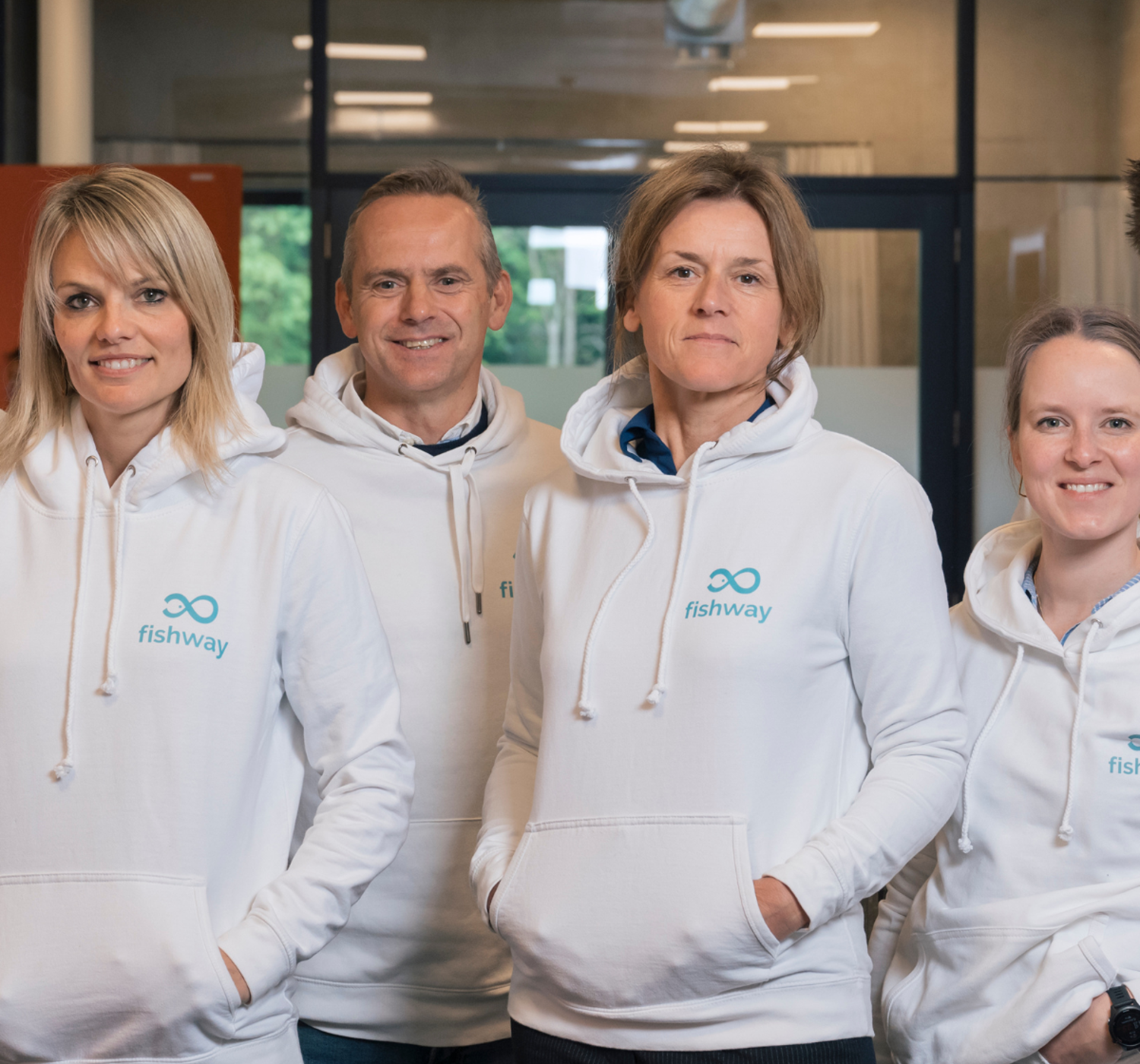
Fishway, member of Planet B.io, is the new kid on the block in the field of cellular aquaculture. Founded by Nina Coolsaet and Sam Van de Velde, Fishway aims to address the pressing challenges faced by the traditional fishing industry, such as overfishing, pollution, and the decline in biodiversity. By producing fish-derived ingredients, Fishway hopes to offer a sustainable alternative that preserves the nutritional benefits of fish without the environmental downsides.
How it all began…
The idea for Fishway emerged from Nina Coolsaet’s extensive experience in the aquaculture industry. She realized that the traditional system of farming animals for food was deeply flawed. “Hearing about cultured meat sparked my interest significantly. A conversation with Mark Post solidified my conviction. My experience as an industry expert proved invaluable, especially when I became involved with Mosa Meat,” says Coolsaet. The concept for Fishway began to take shape, and with Sam Van De Velde as the financial partner, the foundation was laid for a promising initiative aimed at innovation and sustainability in the food industry.
A Focus on Ingredients, not Fillets
The traditional fishing industry faces significant sustainability challenges. Overfishing depletes ocean stocks, while the rising demand for fish outstrips supply. "At Fishway, our mission is clearly defined: we aim to make cultivated fish an everyday product and create a significant impact by producing it on a large scale. Our goal is to provide high-quality ingredients rather than ready-to-eat fish fillets, thus avoiding direct competition with traditional fishing and aquaculture,” Coolsaet explains. “The predicted global shortfall in fish production by 2050 is 70 million tons. We aim to fill this gap with a consistent supply of healthy ingredients based on fish cells."
Innovative Cultivation Process
Fishway's technology leverages the robustness of fish cells, which can grow at room temperature and do not require genetic modifications to remain viable. "We focus on fish species that can grow optimally at room temperature, such as sea bream, sea bass, and eel," Coolsaet notes. “This reduces electricity costs and improves sustainability.”
The company has already made significant steps, developing ten immortal cell lines from four different fish species. Fishway concentrates on proteins and fats, which are key components of fish nutrition. These cells are grown serum-free and are moving towards 3D cultivation in bioreactors. "We have achieved a substantial reduction in costs and are progressing towards larger scale bioreactors," says Coolsaet.

Scaling Up and Future Plans
Fishway aims to scale up production from small bioreactors to 50-liter bioreactors by 2026. “This scale-up is crucial for producing enough batches to meet regulatory requirements and to begin commercial production," Van de Velde explains.
The company has already raised significant funds, including a recent investment of 1.5 million euros from a Belgian family office. This funding will help Fishway scale up its operations and prepare for the next round of fundraising aimed at reaching 10 and 50-liter bioreactors.
Market Focus
One of the first markets Fishway targets is pet food, which requires less stringent regulatory approvals compared to human food. For human consumption, they focus on infant and elderly nutrition, aiming to replace fish-derived products with cell-based alternatives. "We can provide a consistent supply of a pure and exceptionally healthy product that meets strict standards, unlike traditional fishing or farming methods. It’s completely free from contaminants," Coolsaet explains.
"We can provide a consistent supply of a pure and exceptionally healthy product that meets strict standards, unlike traditional fishing or farming methods. It’s completely free from contaminants."
Strategic Partnerships and Regulatory Challenges
To accelerate its development Fishway is actively seeking partnerships. "Our strategy is to operate as a B2B company. We are simplifying the technology and looking for the best partners in bioreactor development, media development, and pilot production," says Coolsaet. This collaborative approach is essential for navigating the complex regulatory landscape, especially in Europe, where novel food regulations are stringent.
Being a member of Planet B.io offers advantages that drive their mission in cellular aquaculture. “Increased visibility is essential for a small company like ours,” explains Coolsaet. “Additionally, being part of Planet B.io opens opportunities to connect with specialized talent for process development and access analytical services that are otherwise too expensive for us at this early stage.” The membership also provides valuable networking opportunities with other companies in the cellular agriculture field. “We see this as a chance to join forces with others facing similar challenges and to support each other’s success in bringing innovative technologies to market, especially in Europe,” Coolsaet adds.
Looking Ahead
In five years, Fishway envisions itself as a major player in the production of fish-derived ingredients. "We aim to have reached production scale for both pet food and human food in Europe, producing 6000 tons per facility," says Van de Velde.
While the European market presents regulatory hurdles, Fishway is optimistic about its global prospects. "If Europe doesn't allow it, we might set up in places like Singapore or the US, where regulatory frameworks are more supportive of cultivated products," Van de Velde adds.
Fishway's journey is a testament to the potential of cultivated fish to transform the food industry, offering sustainable and nutritious alternatives to traditional fish-derived ingredients. By focusing on innovation, strategic partnerships, and with the support of the Planet B.io ecosystem, Fishway is poised to become a leader in the cultivated fish sector, contributing to a more sustainable and food-secure future.
Want to learn more about Fishway? Check out their website; www.fishway.fish
